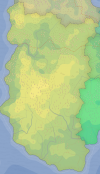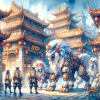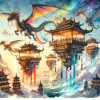Novama
Elder Member
Isekai Hell - West Empire
The Western Empire, also known as the Ororoot Empire, stands as a majestic realm on the western coast of the 2nd continent. Governed by a strict class system with the Emperor at its pinnacle slaves as its base, this nation thrives on a complex economy driven by trade, magical innovations, and a unique synergy with both monsters and beastmen. Its capital, Quang, a bustling port city, serves as the heart of commerce, benefiting from strategic geographic advantages and a diverse cultural fabric. The empire's economy is bolstered by the Adventurer's and Merchant's Guilds, which navigate the challenges and opportunities presented by the realm's magical landscapes and creatures. With slavery and monster Taming, regulated by rituals under the Church Faction's watch, the Western Empire remains a beacon of power, tradition, and magical prowess, standing resilient against both internal and external forces seeking to disrupt its celestial harmony.
Last edited:








